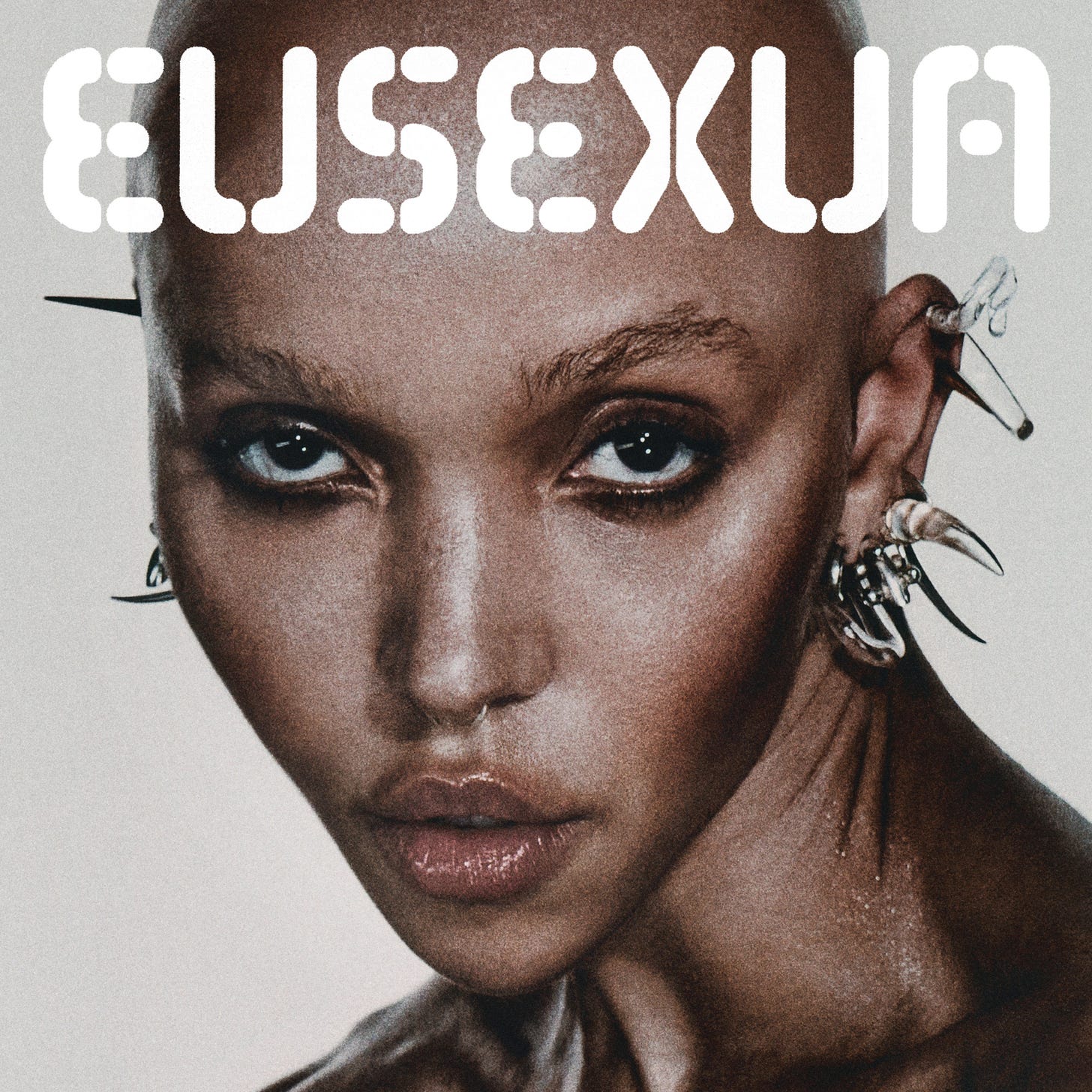Album Review: Eusexua by FKA twigs
Sex-beats and playful melodies: The British model and pop enigma FKA twigs experiments with club sounds on ‘Eusexua’—her new album—to heal her soul from abuse.
She could always rely on her body—Tahliah Debrett Barnett. It is her armor, her weapon, and the symbol of her strength. In 2017, only a short time after having six benign tumors removed from her uterus, she danced so vigorously and acrobatically in a commercial directed by Spike Jonze that her stitches tore open. It is no wonder, then, that the British artist—considered one of the most innovative and daring figures in recent electronic music—is perceived as an extremely body-focused individual. This is true not only in the videos for her often enigmatic music, in which she appears in fantastical, sometimes painfully distressing horror metamorphoses, but also in numerous advertising campaigns.
FKA twigs is the name Barnett uses as an artist. She is a pop singer and actress but also a model and style icon who sees herself in a lineage with Josephine Baker and Grace Jones. In January 2024, she pushed back against the ban of a Calvin Klein advertisement in the UK, which critics said reduced her to an object. The posters showed her wearing a denim shirt covering only half of her body, exposing the other half. “I don’t see the stereotypical sex object they accused me of being,” she wrote on Instagram at the time (the post has since been deleted), “I see a beautiful, strong woman of colour whose incredible body has overcome more pain than you could ever imagine.”
Now, after a longer hiatus, FKA twigs is releasing her third studio album—and on it, she wants nothing less than to transcend her own body, abandon its protective armor, and dissolve into ecstasy. Barnett explained that her newly coined term, Eusexua, is the title of the album, describing a state of euphoria so overwhelming that you feel as if you’re transcending the shape of your own body. In a Vulture interview, she elaborated: “It’s like when you’ve been kissing a lover for hours and turn into an amoeba with that person. You’re not human anymore, you’re just a feeling,” she says. “Or that moment right before an orgasm: pure nothingness, yet also pure concentration. That’s how I want to live my life right now.”
“It feels so good,” repeats FKA twigs in the refrain of “Room of Fools.” And indeed, it feels quite good to have an FKA record back in rotation after so long. Six years—that’s the amount of time between the new Eusexua and the previous Magdalene. But there was no void in between. In 2022, she released the intriguing Caprisongs, a commercial mixtape in which she had fun hopping between rhythms alongside artists such as The Weeknd, Shygirl, Pa Salieu, Jorja Smith, and Daniel Caesar, with productions by Arca, El Guincho (remember Rosalía’s El Mar Querer?), and Mike Dean (the eminence grise behind some of Kanye West’s masterpieces).
Quite a divertissement, right? Less fortunate was her co-starring film debut in the remake of The Crow, for which she “earned” a Golden Raspberry Award nomination for Worst Actress—a stark contrast to her many Grammy nods, such as the 2020 nomination in the Best Music Video category for the stunning “Cellophane,” directed by Andrew Thomas Huang. While filming in Prague, she discovered a love for the underground parties in the local club scene, she recounted during an appearance on Jimmy Kimmel Live in August, when the film was released in the United States.
The dark ghost story starring her and Bill Skarsgård flopped at the box office and with critics. As a side effect, however, FKA twigs’ previously often inward-folded music experienced an exciting opening up and revitalization—an expression of a feverish, life-hungry longing for love and community, for merging with others through sound.
That longing may also stem from the fact that although Barnett, a trained dancer, has turned her body into a rigorously well-conditioned work of art, the soul within remains fragile and vulnerable. Not least because of a toxic relationship with the American actor Shia LaBeouf, in which FKA twigs found herself when her second album, Magdalene, was released in 2019—an experience that apparently left deep wounds. Barnett accuses the Transformers star of sexual assault, bodily harm, and emotional abuse; LaBeouf denies the allegations. The injuries she suffered back then are presumably now on the path to healing through the invigorating sounds and vibes of this record.
Let’s say it right away: Eusexua arrives with a hefty load of expectations. The idea is to intensely focus on beat—or rather, beats—since much of the album aims to get you moving. It’s an intention FKA set up over the last year and a half: first, at the end of 2023, by performing a version of a club classic like “It’s a Fine Day” by Opus III at a Vogue event in London, and then by consulting with new sensations of the English electronic scene, Two Shell, who helped her reconstruct this album after 85 of her demos were illegally shared online (her thanks came in the form of guest appearances on two of the duo’s tracks, “Talk to Me” and “Round”).
Accordingly, nearly every track on the new record is infused with driving techno and house, including the pumping title track, the radio-friendly anthem “Perfect Stranger,” and the more experimental “Drums of Death,” whose basic framework was supposedly composed by producer Koreless (as on Magdalene) on a flight to a gig at Berghain in Berlin, ensuring a credible sound texture that blends the tradition of English clubbing with more contemporary elements. You’ll find electronica, IDM, hyperpop, and trip hop, with touches of house and techno evoking what Simon Reynolds would define as the hardcore continuum. Eusexua is dance pop broadcast from a pirate radio station.
In “Perfect Stranger,” we’re in Kylie Minogue territory (try singing the “na na na” from “Can’t Get You Out of My Head” over the verse—it works incredibly well), while for the first half of the closing “Wanderlust,” it feels like we’re hearing an outtake from Brat by Charli XCX—though the track then moves toward more distinctly ’90s references, a bit of Sega Bodega, a bit—once again—Ray of Light. In “Sticky,” we get perhaps the FKA twigs we love best, the one who deftly merges playful referentiality (here, a double reference: the reworked sample from “Avril 14th” by Aphex Twin, which Kanye West had already repurposed in “Blame Game”) and futuristic thinking with unparalleled grace. It’s something we also find in the abrasive minimalism of “Drums of Death,” as mentioned earlier, the best-produced track on the whole album.
However, the most direct reference you can spot here doesn’t come from some MDMA-fueled record produced after a night in a warehouse but rather from Ray of Light by Madonna, the album the pop queen released in 1998 with English musician William Orbit at the helm. The link isn’t just the fusion of pop songs with underground British dance but also the creation of a driving sonic mood—deep and icy in its own way, like a rave out in the fields of Lancashire. And FKA herself referenced techno and raves in one of her few pre-release interviews on Jimmy Kimmel Live!: “I’m obsessed with alternative cultures and subcultures, so I couldn’t resist a new place I had never visited before—warehouse raves and the Eastern bloc techno kids.”
The album feels like a trip through a club night, through the euphoric moments of self-assurance as well as the melancholic and shaky ones. There are pulsating sex beats and playful melodies alike. With “Girl Feels Good,” the singer’s first truly straightforward pop song appears on the album, and the Madonna reference is clearer than ever, while “Room of Fools” (one of the most effective cuts of this techno-pop approach) is a rave where nostalgia and the future blend in a Björk-esque style. “Striptease” is a crystalline hyperpop ballad that explodes into drum ‘n’ bass. At times, you might think you hear beyond the influences of Madonna; at others, Massive Attack.
Still, despite this new accessibility, the music remains experimental and disconcerting. Even the most radical recent pop concept in the charts, Brat by Charli XCX, sounds tame and predictable compared to the abysses lurking behind every beat on Eusexua. So even in the face of what is likely the biggest shift in her sound to date, FKA twigs remains true to herself: in 2012, she was discovered by the British lifestyle magazine i-D and immortalized on its cover as an It-girl with an extravagant knotted hairstyle, winking provocatively at the camera. Even then, Barnett seemed like an alien, straight out of a provocative science fiction film. Today, she’s a familiar foreign body—one you’re happy to let seduce you onto the dance floor.
Standout (★★★★½)
Favorite Track(s): “Girl Feels Good,” “Perfect Stranger,” “Drums of Death,” “Striptease”





